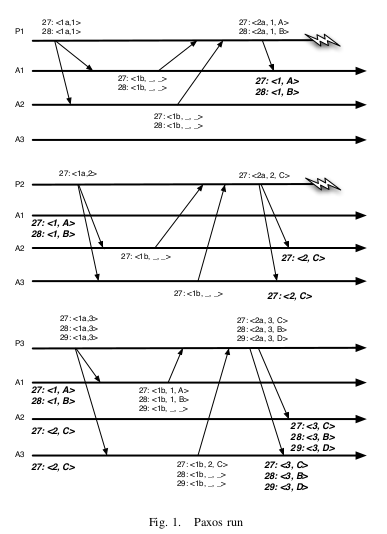Reading notes: Zab: High performance broadcast for primary-backup systems
Zab stands for Zookeeper Atomic Broadcast. The authors published this paper describing the atomic broadcast protocol of Zookeeper.
Atomic broadcast was not a new problem at the time of publishing. Paxos already described a way to achieve that. Zookeeper requires two properties for success:
- An efficient recovery process
- Primary order, a stronger guarantee than atomic broadcast
The authors note that classical Paxos does not solve these issues. It explains the need for another protocol.
Primary order
This seems surprising at first because Paxos offers linearizability, what would you need over that?! The following case is presented:

Value A does not end up in the final ordering.
This can lead to weird behavior if B depends on A.
If the system using the protocol cannot batch A and B together, then greater guarantees are needed.
This is where they define primary order.
Primary order tackles this issue: decided values must be causally consistent with the previous decided value.
Recovery
Once you guarantee primary order, recovery becomes less of a problem. You only need to recover from the latest accepted value and not all instances of your log.
With Zab recovery only requires knowing of the latest accepted value. Primary order guarantees that previous values are also accepted. The leader recovers its history until the latest accepted value and progress is resumed.
If you are using classical Paxos, you need more than simply the latest accepted value. Every node can have a different view of accepted values. The new leader must recover all possible values from the latest learned value. This requires involving the whole available quorum.
The protocol
Zab consists of 3 phases:
- Phase 1 allows selecting the next leader.
- Phase 2 restores the latest history of values to the leader.
- Phase 3 consists of the leader broadcasting the values.
I won't cover the details, but basically, zab is similar to Paxos with a safe recovery phase. In a catastrophic scenario, zab requires a whooping 5 RTT (round trip time) to make progress. With a stable leader, 2 RTT is sufficient.
The recovery and primary order require one more RTT than classical Paxos. But since they only weigh on rare failure events, it's not an issue for production.
Conclusion
This paper is really interesting because it presents the protocol entirely, even with recovery. It helps at getting the general picture of the protocol. This means that you can try to implement zab yourself!
Interestingly, they designed the protocol based on their need. Primary order is not something all systems require. If the state machine can batch values together, Paxos is a better alternative. Nevertheless, it is now one of the most deployed database of its kind.
Like Kyle Kingsbury notes, it is one of the rare database to resist the infamous Jepsen test. Although not a theoretical breakthrough, zab is an industrial success. It provides the bedrock for widespread technology like Cassandra or Kafka.
I might also read the more general paper on Zookeeper sometime soon. I wish to find the answer to the critical question: how come primary order was required in the first place.
Take care!
